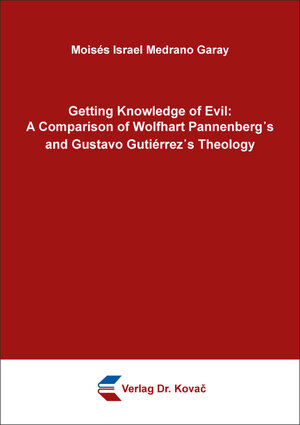Getting Knowledge of Evil: A Comparison of Wolfhart Pannenberg᾿s and Gustavo Gutiérrez᾿s Theology
von Moisés Israel Medrano GarayThis book compares the understanding of evil by Wolfhart Pannenberg and Gustavo Gutiérrez. It addresses the question on, how do Pannenberg and Gutiérrez get knowledge of the “reality” of evil? The answer to the question is that they get knowledge of such a “reality” in a very similar way: dialectically and interdisciplinary. On the one hand, it has to do with the fact that both theologians ground their theological knowledge of finite realities with the help of different “empirical sciences” – in an effort to avoiding the metaphysical or rationalist approach of the past. On the other hand, it has to do with the fact that both theologians relates reason, experience and faith in a similar dialectical manner. Yet, Pannenberg’s and Gutiérrez’s way of getting to know the “reality” of evil does not lack important differences. It has to do with their different epistemological assumptions: coherentism (Pannenberg), and moderate foundationalism (Gutiérrez) .
In any case, the similarities between Pannenberg’s and Gutiérrez’s way of obtaining knowledge of the reality of evil are surprising. The reason is that Pannenberg is a well-known European systematic theologian of the last century, and Gutiérrez is a Latin American liberation theologian from the same age. The former is regarded as a theoretic thinker, while the latter one is seen as a practical oriented theologian. Yet, both Pannenberg and Gutiérrez understand theology as a scientific and historical endeavour, in which experience plays a central role. It is in relation to all of it, that evil is understood as an abstract and “concrete” “reality” (Pannenberg), or as a subjective and objective “reality” (Gutiérrez).
In any case, the similarities between Pannenberg’s and Gutiérrez’s way of obtaining knowledge of the reality of evil are surprising. The reason is that Pannenberg is a well-known European systematic theologian of the last century, and Gutiérrez is a Latin American liberation theologian from the same age. The former is regarded as a theoretic thinker, while the latter one is seen as a practical oriented theologian. Yet, both Pannenberg and Gutiérrez understand theology as a scientific and historical endeavour, in which experience plays a central role. It is in relation to all of it, that evil is understood as an abstract and “concrete” “reality” (Pannenberg), or as a subjective and objective “reality” (Gutiérrez).






